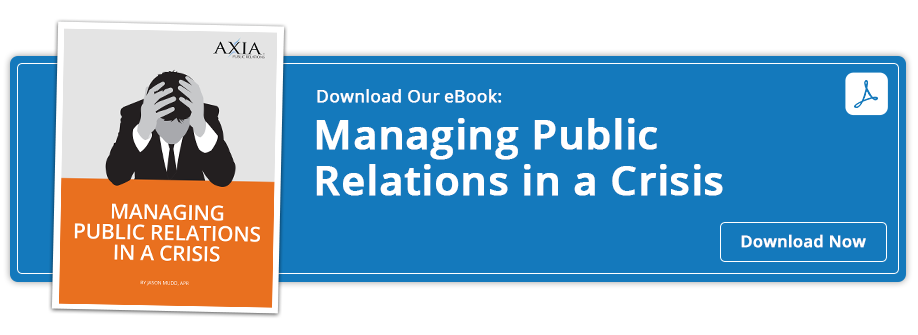 Do they stay or do they go?
Do they stay or do they go?
OK, here we go again. Reputations are floundering; our heroes are no longer heroic. From Jared Fogle to Bill Cosby to Brian Williams, questionable decisions will either show resilience or that the ultimate mistake can destroy careers.
The solution: A damage control team has to always be on deck. Honesty and transparency will help mitigate the problems, but with the advent of social media and round-the-clock news both off- and online, you’d better be quick to take action.
Public figures from politicians to athletes to actors and now newscasters live in the limelight and require their own personal scripts in the form of customized apologies. Since news goes viral in a flash, it’s the PR pros who are the ones to save the day. In the event of unacceptable behavior, the offending celebrities will be hit from all sides, with social media leading the way. Here are some lessons learned and a few tips for the future:
1. Take immediate and decisive action, and if you have a strong brand, use it. PR is all about perception, and all of its tools – crisis management, media relations, corporate social responsibility and reputation management – need to be synergized when a crisis is about to hit.
2. Re-examine who’s representing your brand. We need to have this conversation: Is the troubled spokesperson actually driving sales or is he just window dressing? Here’s a good example: Jared Fogle, the long-term spokesperson for Subway restaurants, is not window dressing.
Fogle is still hanging on because he not only helped make the brand profitable, he also represents the most positive aspect of the franchise: healthy meal options. His departure is going to weigh heavily on whether or not he should continue to represent the Subway brand.
3. Anticipate the barrage of news coverage and prepare for it. “Winging it” is no longer in the PR lexicon – except, apparently, for the Emmy Award-winning journalist Brian Williams, whose disorganized response to challenges against his claims had NBC flummoxed. Should he stay or should he go? He stays, but is moving out of the anchor chair. Since his brand brought in high ratings and his reputation was diminished but did not disappear, NBC’s executives carefully considered the decision to keep him over weeks of conversation with management.
Others have not fared so well.
4. Address the elephant in the room. Don’t try to ignore it, cover it up or forget it exists. It used to be that, in the pre-social media era, if a brand’s celebrity spokesperson messed up, he’d be dumped like a “hot rock.”
From 1997–2001, Tiger Woods won 27 championships, tournaments and individual games and was an idol to his fans and the media. His life and career – not to mention all that adulation – fell apart when his wife chased him through the house after finding out he was unfaithful. Even though he continued winning championships yearly; he was photographed with President Obama; and was the first athlete to earn $1 billion, the only thing people were reading about was the Tiger Woods cheating scandal in The Enquirer and later The Daily Beast. To make things worse, he was in an auto accident shortly after the argument. The elephant got bigger and bigger as Woods avoided the police and the media like the plague. Gloria Allred cancelled a scheduled press conference and what came next? Porn stars, strippers and escorts all came forward claiming they had been intimate with Woods. After the media found out about the 15 mistresses, he lost major endorsements and announced he was leaving golf. Woods’ game never recovered.
Even if trust is already broken, there are tactics that can lessen the punishment. If not handled strategically, the reputations of offending public figures will spiral out of control.
Accountability: Just say you’re sorry. Our country is a land of second chances. Paula Deen’s empire took two haircuts. A couple of years ago, she was quoted in a deposition as having used the N-word in her business routinely. She made a brave stand, apologized, went on TV (not a flattering moment), lost a couple of lucrative gigs but kept the majority of her business intact. Just recently, a tweet featuring her son in blackface showed up online. She immediately took the picture down, terminated her social media manager and apologized. It’s too soon to say what it will mean for her reputation, but I doubt anyone moving forward will ever see her as anything but, at least, insensitive.
Denial: Get out from under the bed. Bill Cosby, who has long been a role model, a family icon and popular comedian, turned his back on the barrage heading his way. Accusations are coming in waves from women from all walks of life who claimed he drugged and abused them. He ignored this career-ending barrage of accusations because he believed his celebrity status was impenetrable.
Cosby did admit that he gave Quaaludes to a woman for the purpose of sex as part of a civil case in 2005, which was settled in 2006. What he should have done but didn’t: Show his human side and interact with the media; don’t let his accusers dominate the story; explain his role in the story, with friends and family by his side. Well, it’s too late now. At this point, he definitely needs to say more than “no comment.”
Related post: Don't Wait Until a PR Disaster to Realize You've Got the Wrong Spokesperson at the Mic

Erica Cottrill is an Atlanta-based PR practitioner with 20 years of experience helping businesses build their brands. Connect with Axia Public Relations on Twitter @axiapr.
Featured image credit: 123rf.com
Topics: public relations, crisis communications


Comment on This Article